
Girls in Justice System Often Traumatized Victims of Abuse
|
Girls are more likely to be arrested for less serious offenses but are more likely to have serious problems, including a history of physical and sexual abuse.
Juvenile Justice Information Exchange (https://jjie.org/series/mental-health-2/)
It presents one of the most vexing challenges facing our nation’s juvenile courts and corrections systems: how to treat, supervise, punish or just plain cope with troubled teens whose delinquent behaviors are connected to or caused by emotional disturbances and mental health problems. Many recent studies concur that two-thirds or more of all youth confined in juvenile facilities nationwide suffer from one or more mental conditions, and perhaps one in five suffers from a serious and debilitating mental illness – far more than in the general youth population. Awareness of the mental health/juvenile justice challenge is rising. Still, all across the country juvenile justice systems are struggling to respond.

Girls are more likely to be arrested for less serious offenses but are more likely to have serious problems, including a history of physical and sexual abuse.
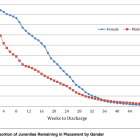
Girls serve longer sentences than boys in the Texas juvenile justice system, and for less serious offenses, according to a new study from the University of Texas at Austin.
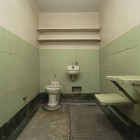
In video footage released today from inside Connecticut’s juvenile correctional facilities, a distressed girl screams as she is restrained on the ground in a corridor.

“I wasn’t fighting with the insurance company” over the 30-day limit for her son's treatment, Missy Owen says. “We were following what they told us to do. … I was a very young addict’s mother. I didn’t know what I didn’t know. … When they told me my kid was good to go in 21 days, I was like, ‘Thank you, Jesus.’ I had no idea.”
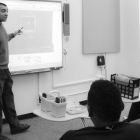
A program enabling a shot at redemption and a chance to graduate from high school.
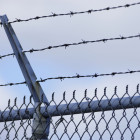
A year ago, Jaime Peoples was languishing at the Illinois Youth Center (IYC) juvenile detention facility in Kewanee, Ill., having spent a year awaiting a full mental health assessment, according to his mother, Celia.
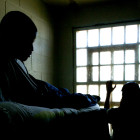
This is what it looks like when you overhaul a juvenile justice system.

“The Anonymous People” is a spunky profile of the burgeoning grassroots drug and alcohol recovery movement. The film was made by 30-year-old first time feature length filmmaker Greg Williams, who himself has been in recovery since he was 17-years-old.

A pilot program in Michigan provides police training on how to recognize and respond to mental health and substance abuse problems with youth.
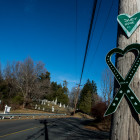
Funds for mental health budgets were slashed a combined $4 billion from 2008 to 2012. In the wake of the shooting at Sandy Hook Elementary School last December experts have watched that trend sharply reverse.